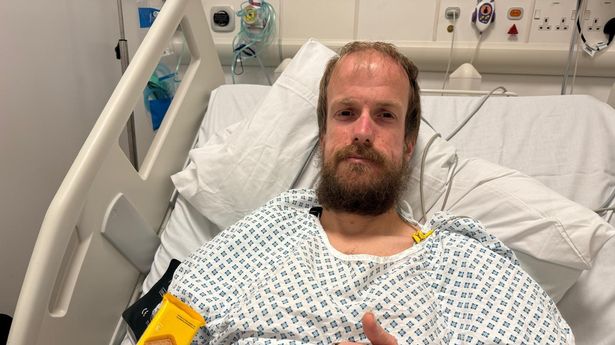A music teacher dying of cancer who played a key part in Labour’s election campaign has backed calls to legalise assisted dying.
Nathaniel Dye, 38, who shared his cancer story at the Labour manifesto launch, is pleading with MPs to think of the “profound difference” they can make by giving people control over their deaths.
The campaigner, whose stage 4 incurable bowel cancer has spread to his liver, lungs and brain, said he believes giving terminally ill people the option of assisted dying is the “kind” and “compassionate” thing to do. He makes the plea as a Bill to legalise assisted dying is expected to be published in full on Tuesday ahead of the first vote on the issue on November 29.
In an interview with the Mirror, Mr Dye spoke about experiencing a “humongous tsunami” of pain when he suffered a bowel obstruction in January last year. He said: “My internal monologue was a whimper. I was calling for my mother and she'd been dead for years. Pain makes you lose your dignity.”
Mr Dye has now teamed up with campaign group Dignity in Dying after hearing devastating stories of death - including one of a music teacher who had a bowel obstruction and died vomiting his own faeces. “I couldn't not imagine that being me,” he said. “If there's a way to avoid that kind of horrible death, when someone is just dying anyway and really much might as well be dead and everyone agrees, can we look at that?”
Mr Dye said he holds nothing against his MP Health Secretary Wes Streeting, who has said he plans to vote against a change in the law as he is concerned about palliative care "not being good enough to give people a real choice". But Mr Dye added: “I'd like to think that palliative care can be improved at the same time as assisted dying being an option. Say for example I'm in a lot of pain and even the best palliative care can't do anything about that, I can imagine a situation in which it would be the best thing for me, for my family, to have this option.”
Labour MP Kim Leadbeater’s assisted dying bill is expected to propose giving terminally ill adults with less than six months to live the power to shorten their deaths if they wish. Strict safeguarding measures are expected to include the patient needing to have mental capacity to decide and for two doctors and a judge to sign off each case.
Seven current and former nurses have sent a letter, published by Dignity in Dying, urging MPs to support the Bill. The signatories, including two palliative care nurses, a general nurse and a senior nursing assistant, said: "We are joined by a single wish - all of us want choice.
"For most, palliative care in hospice, hospital or at home will help them have the death that they want. But we feel we have to speak up for those for whom palliative care cannot relieve suffering, or provide the peaceful and painless death that everyone deserves.”
High-profile voices for change include Dame Esther Rantzen, who is terminally ill, while the Archbishop of Canterbury Justin Welby and actor and disability campaigner Liz Carr have voiced their opposition.
Dr Gordon Macdonald, chief executive of Care Not Killing, insisted MPs must reject the Bill, saying "the safest law is the one we currently have". He said: "This Bill is being rushed with indecent haste and ignores the deep-seated problems in the UK's broken and patchy palliative care system, the crisis in social care and data from around the world that shows changing the law would put pressure on vulnerable people to end their lives.”
